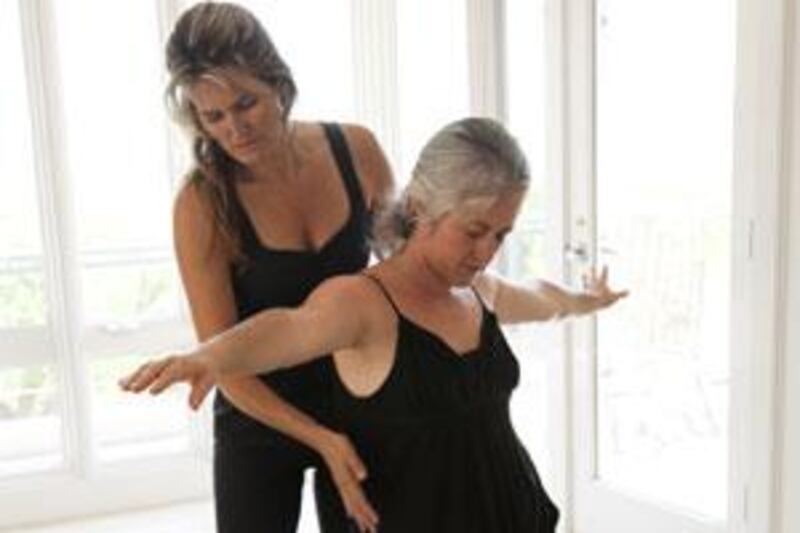While many of us grew up being encouraged to pursue just one career, increasing numbers of people are taking on second jobs in the well-being sector to help them to flourish as individuals. Their roles are often far less lucrative than their other jobs, but these coaches, teachers and therapists say their well-being work has given them a chance to achieve a work-life balance and personal growth where their often more isolating or money-focused first jobs have not.
By learning to coach, give someone a massage or teach meditation, the practitioners can not only help other people to be healthier and happier, but also encourage themselves to eat better, sleep better and find a more worthwhile direction in their lives. These roles have also helped them perform their other jobs better, they claim. Janice Barnett's work as a life coach helped her find balance in her life while she worked as a diplomat at the British High Commission in Dubai. Before that, she worked in law enforcement.
"My day job as a law enforcement officer was a battle against drugs and other serious crime. I felt I was serving society, but my coaching brought a deeper satisfaction by serving individuals and honouring myself," she says. "Combining the two invigorated me, brought me into contact with a broader range of people and kept my interest in both fresh." Barnett was one of the founders of www.pathfinders.com, a company that coaches individuals as well as corporate teams, and she found that the skills she was teaching others also applied to her own life.
"Coaching enables you to focus on what is important in life and gain perspective," she says. "I felt calmer and slept better, and by learning how to prioritise, found I had more time for relaxation. "After working for 25 years as a diplomat, life coaching gave me the confidence I needed to found my own life coaching business. I loved my diplomatic role, but I didn't want the travel and stress in my life permanently."
Indeed, it seems that the more stressful the main career, the more rewarding those second jobs can be. Take the financial trader Simon Andriesz, who describes his evening and weekend kundalini yoga and meditation teaching at his centre Alchemy as "a passion and a service" that has made him a better team leader. "I was self-destructive, became physically and mentally exhausted, and realised I needed more than an occasional gym session to improve my health and happiness," he says of his former life. "Teaching and practising kundalini [a holistic system that involves breath, mantra, movement and body postures] keeps me physically fit, but also stops me staying stuck in a particular mood. I still get down, but I can move into a positive mind space more quickly.
"Kundalini promotes self-awareness, so I understand my real nature better, which has made me less reactive to situations. I feel able to make better decisions and to lead through example." For Andriesz, it is not just the characteristics of the yoga that helps: it is the act of teaching. "Teaching is a selfless act, so it takes me out of my self-centred fears and enables me to give to others," he says. "It reduces the ego and creates the space required between thoughts. I can see my part in any given situation now rather than just my point of view, which has made me a far better communicator."
Barnett says: "The two roles kept my mind alert too, by providing a mental balance. Law enforcement focused on locking people up, coaching with freeing them; law enforcement had strict rules, coaching involved a world of endless possibilities." Although there can be problems with having a second job - whether administrative or financial - the emotional rewards can be great. Mahasen al Mahasneh, a full-time student coordinator at Al Hosn University in Abu Dhabi, says her training as a pranic healer has made her "a kinder, happier, healthier and stronger" person.
"Pranic healing is an energy-based system that uses prana, or life force, to heal physical, mental and emotional upset," she explains. "While I support students during the day, my healing is about helping a larger range of people, both young and old. I am learning to use meditation, visualisation and breathing techniques in my healing work, which encourages me to love unconditionally and accept others for who they are. I feel more in harmony with the world, and tolerant of everyone in it."
That can be a mind-changing and even life-changing experience, says Mahasneh. "Healing helps me put a smile on people's faces, which gives me a huge sense of gratitude. I feel more fit because of the regular rotating and jumping exercises I use to prepare my body before a healing session. Best of all, I feel better able to look on the positive side of things, to see supposedly 'bad' experiences as blessings. I am more likely now to see life for what it is, and not to react to every little thing."
As Andriesz says: "Participating in life, using your talents and just having more integrity makes a real difference to the world." For details of the Dubai branch of Pathfinders, visit www.pathfinders.com. Simon Andriesz will lead a kundalini retreat in Sri Lanka in April; visit www.alchemythecentre.co.uk/workshops. To contact Mahasen Mahasneh, call 050 521 7427 or e-mail mahasen32@yahoo.com.











